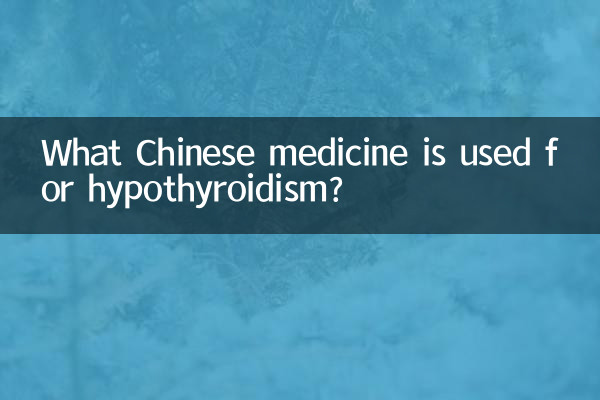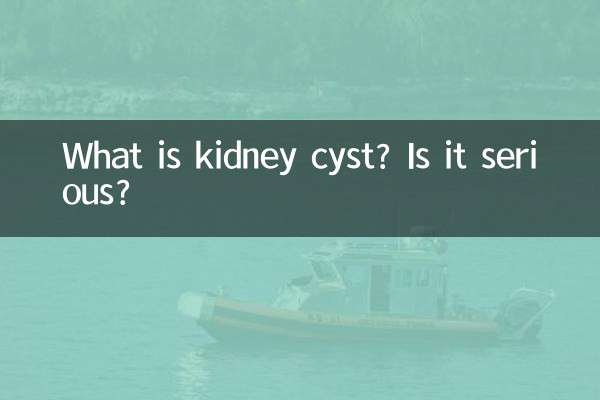What Chinese medicine is used for hypothyroidism?
Hypothyroidism (hypothyroidism) is a common endocrine disease. Traditional Chinese medicine believes that its cause is mostly related to spleen and kidney yang deficiency and insufficient qi and blood. In recent years, traditional Chinese medicine has attracted much attention in regulating hypothyroidism. This article will combine the hot topics and hot content on the Internet in the past 10 days to give you a detailed introduction to the traditional Chinese medicine treatment plan for hypothyroidism and provide structured data for reference.
1. Common TCM syndrome differentiation and medication for hypothyroidism

According to the theory of traditional Chinese medicine, hypothyroidism can be divided into the following types, and the corresponding traditional Chinese medicine treatment plans for each type are also different:
| Syndrome differentiation | Main symptoms | Commonly used Chinese medicine |
|---|---|---|
| Spleen and kidney yang deficiency type | Aversion to cold, cold limbs, fatigue, edema, loss of appetite | Aconite, cinnamon, dried ginger, Atractylodes, Poria |
| Qi and blood deficiency type | Pale complexion, dizziness, palpitations and shortness of breath | Astragalus, Codonopsis pilosula, Angelica sinensis, Rehmannia glutinosa, White peony root |
| Phlegm-dampness block type | Obesity, chest tightness, thick and greasy tongue coating | Pinellia ternata, tangerine peel, Poria, Atractylodes, Magnolia officinalis |
| Liver Qi stagnation type | Depression, flank pain, irregular menstruation | Bupleurum, Cyperus cyperus, turmeric, white peony root, Chuanxiong |
2. Commonly used Chinese medicine prescriptions for treating hypothyroidism
Traditional Chinese medicine often uses compound preparations to treat hypothyroidism. The following are some commonly used clinical prescriptions:
| Prescription name | Main components | Indications |
|---|---|---|
| Jingui Shenqi Pills | Aconite, cinnamon, rehmannia glutinosa, yam, etc. | Kidney yang deficiency type hypothyroidism |
| Buzhong Yiqi Decoction | Astragalus, Codonopsis, Atractylodes, Angelica, etc. | Hypothyroidism due to Qi and blood deficiency |
| Erchen soup | Pinellia ternata, tangerine peel, poria, licorice | Phlegm-damp hypothyroidism |
| Xiaoyaosan | Bupleurum, angelica, white peony root, atractylodes, etc. | Hypothyroidism due to liver stagnation and qi stagnation |
3. Application of single traditional Chinese medicine in the treatment of hypothyroidism
In addition to compound preparations, some single Chinese medicines have also been proven to be helpful in improving the symptoms of hypothyroidism:
| Chinese medicine name | Main functions | modern research |
|---|---|---|
| Astragalus | Replenish qi and raise yang, enhance immunity | Regulates hypothalamic-pituitary-thyroid axis function |
| Angelica sinensis | Enrich and activate blood, improve microcirculation | Contains a variety of amino acids and trace elements |
| aconite | Warms the kidneys, supports yang, and improves chills | Use with caution and the guidance of a professional physician |
| seaweed | Soften and dissolve hard knots, rich in iodine | Helps with hypothyroidism caused by iodine deficiency |
4. Precautions for treating hypothyroidism with traditional Chinese medicine
1. Traditional Chinese medicine pays attention to syndrome differentiation and treatment. Patients with hypothyroidism should take medication under the guidance of professional traditional Chinese medicine practitioners and are not allowed to make their own prescriptions.
2. It usually takes 2-3 months for Chinese medicine to treat hypothyroidism to be effective, and patients need to be patient.
3. Integrated traditional Chinese and Western medicine has good therapeutic effect, and Western medicine cannot be stopped without authorization.
4. Poisonous Chinese medicines such as aconite must be strictly processed and should be used under the guidance of a physician.
5. Pay attention to your diet while taking the medicine, and avoid eating raw, cold and greasy foods.
5. Lifestyle adjustment suggestions for patients with hypothyroidism
1. Diet: Appropriately increase iodine-containing foods such as seafood, ensure protein intake, and limit high-fat foods.
2. In terms of exercise: choose mild aerobic exercise, such as walking, Tai Chi, etc., and avoid strenuous exercise.
3. Emotion management: Maintain an optimistic attitude and avoid long-term mental stress.
4. Regular work and rest: ensure adequate sleep and avoid staying up late.
5. Regular review: Check thyroid function regularly and adjust the treatment plan in a timely manner.
Conclusion
Traditional Chinese medicine has unique advantages in treating hypothyroidism, improving symptoms by regulating overall functions. However, it should be noted that Chinese medicine treatment varies from person to person and should be carried out under the guidance of a professional physician. At the same time, severe cases of hypothyroidism still need to be treated primarily with Western medicine, supplemented by traditional Chinese medicine. I hope this article can help hypothyroidism patients better understand Chinese medicine treatment options and restore health as soon as possible.

check the details

check the details